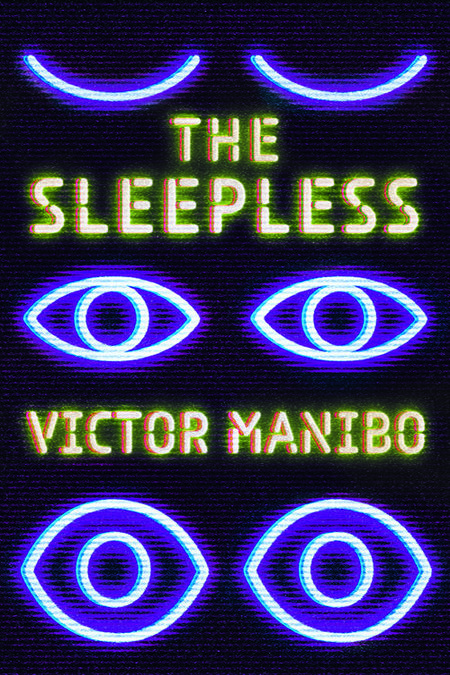ARC courtesy Erewhon Books via NetGalley – The Sleepless releases 2 August 2022.
It’s safe to say that in the third year of the COVID-19 pandemic people understand all too well how disruptive these kinds of events can be.
No longer solely an artefact of post-World War One history, pandemics are very now, very real and something that we all fully understand can upend the status quo, change perspectives and alter worldviews in ways that few other things can.
It’s thus all but inevitable that pandemic-centric novels are going to be in the ascendancy, capitalising on the new appreciation we all have for the fragility of the concept of normalcy, but it is doubtful few will wield as potent a hand as The Sleepless by Victor Manibo, a skillfully-executed, utterly immersive story of one man’s quest to clear his name, reclaim his soul and hopefully save the world in the process.
Think that’s too much to cram into one momentum-fuelled novel? Think again.
With a mastery that hints at a rich future in novel-length storytelling, Manibo manages to be both the architect of a propellant narrative rich in mystery, conspiracy and intrigue and the sculptor of some truly affecting character moments, many of which centre on the protagonist, Jamie Vega, a member of the Sleepless cohort, 25% of the human population who, thanks to a yet-to-be-fully-explained virus, no longer need to sleep.
“Yes, I’m predisposed to hating this city, but I’m even more averse given the sheer density of the Sleepless all in one place. Each of them is a walking reminder of who I have forcibly made myself into. In their eyes I see myself reflected, the fool deceived into taking a great, miscalculated risk. Worse, in them I see how things could have been. Maybe I would have become Sleepless the natural way. Maybe not. Either way, I would still be making memories. Instead, all I have is more hours. No bad dreams, sure, but no dreams at all. And what us one’s life if not the sum of their memories? What is one’s purpose of not the sum of their dreams?”
On the face of it, it’s a boon for those who contract this mysterious condition, freeing them up to do more, work harder, and undertake all kinds of leisure pursuits, all free from the need to devote a third of their time to recharging the batteries.
But with every massive change in the status quo, and make no mistake the presence of about 2 billion people no longer requiring sleep is a seismic shift in everyone’s understanding of what it means to be human, there comes the good and the bad, with the Sleepless the target of vitriol and bigotry with many viewing them as less of an evolutionary step forward and more of a step into a scary unknown.
Jamie is one of the Sleepless but unlike almost every else in this select group, he did not come by it naturally, biohacking himself into Sleeplessness, seduced by the allure of all the time he’ll gain to further burnish his already luminous journalistic career at C+P Media.
It looks like he’s taken the right step until his driven and ambitious boss Simon is found dead one night, and what is initially treated as a suicide becomes something far darker with Jamie fingered as the main culprit for his boss’s demise.
Alas, Jamie can’t remember what he was doing on the night of Simon’s death, his memory holed significantly by what turns out to be a deleterious side effect of biohacking himself into Sleeplessness – an inability to make or retain new memories, a terrifying loss that cuts to the very heart of self-identity and individual humanity.

In Sleepless, Manibo effortlessly combines mystery thriller with existential crisis and ruminations on the state of the world, both as it stands and as it might become, and exploration of the toxically corrosive effects of capitalism run amok.
Throw in characters for whom queerness is a natural and normal part of life – that their lives are queer is simply treated, refreshingly, as nothing remarkable, they just are – and you have a near-future set novel which is personal, political, thrilling and intimate all at once.
It’s a really remarkable piece of work, helped along by the fact that Manibo constructs the action with tautness and solid steps to A to B to C that makes sense while investing each of the characters with a rich, raw humanity which embellishes the action elements, granting them a humanity they might otherwise lack.
This is pedal-to-the-metal storytelling with heart, a visionary piece of future peeking that relies on some unsettling current trends which doesn’t encompass just the awareness of how disruptive pandemics can be, but an innate understanding of how humanity simply doesn’t handle change well and how there will always be forces arrayed to make the most of these disruptions and not in the best interests of all concerned.
By placing an everyman-not-everyman at the centre of the action, someone who is flawed but well-intentioned, talented but prone to making missteps and being a victim of his runaway emotions, Manibo has made Sleepless a novel to which everyone should relate, even if dystopian sci-fi may not necessarily be their first genre port of call.
“A new dawn waits.
It’s a promise, meant to inspire hope. Time was, such a promise would have spurred me to set goals, make plans. To keep the fight, to do it all over, but better. Things I wanted to do, before I knew better. I wanted to do Simon right, I wanted to save C+P, I wanted to stop the rise of extremism, I wanted to stem the unstoppable tide of capitalism. All these wants. Maybe Lochner was right. Desire is a hydra.”
Sleepless is really, when it comes down to it, a story about humanity.
How it excels and fails, soars and crashes to earth and how in doing so, takes things that could be good and finds way to twist and bend them into ugly self-serving ways.
Sleeplessness could be an endless boon for humanity; true it carries risks as far as environmental load on the planet goes – you’re effectively adding a third a third to the population impact which given current trajectories on climate change, destruction of the natural world is far from okay – and does create some societal inequalities but it also allowed people to do more, create more, be more.
Unfortunately, it also stirs up all kinds of bigotry and mistrust, stirring the ugly beast at humanity’s core up in terrifyingly awful ways; the only bright spot are Jamie and the people he encounters who are trying to do good where others are clearly cultivating the darker angels of our nature.
As novels go, Sleepless is up there with the best – rich in immersive mystery-laden storytelling and arrestingly fully-formed characters, redolent with clever ideas and sage observations about the good and bad aspects of humanity and the society we create as a result, and all too aware that it is up to each of us to do something if we see things heading where they should not be, all of us responsible for where humanity as a whole finds itself, not just now but well into the future.
